|
Versión en español
 Behind
every great composer, there is always a great team. People in the
shadows that perform an absolutely indispensable work in the success
of a soundtrack. The sound engineer is one of these people. He is
the main responsible in recording sessions, in squeezing to the maximum
the quality of the score written for a movie, in coordinating the
orchestra and listening to the composer's requirements. Behind
every great composer, there is always a great team. People in the
shadows that perform an absolutely indispensable work in the success
of a soundtrack. The sound engineer is one of these people. He is
the main responsible in recording sessions, in squeezing to the maximum
the quality of the score written for a movie, in coordinating the
orchestra and listening to the composer's requirements.
Nowadays, Dennis
Sands is one of the most important and professional sound
engineer. A real referring in his work, nominated to the Oscars in
several times, and winner of a large number of awards and acknowledgements
due to his recordings.
A real gentleman, in the interview he granted to us, he not only clearly
explains the inner details in his work, but shares with BSOSpirit a
number of interesting anecdotes occured during his career. He shares
his reflections about the demanding universe of economical points
surrounding a movie production. And finally, he talks about his close
friendship, forged through years of work, with composers as Danny
Elfman and Alan
Silvestri, paying special attention to their last works
together: Spider-Man
2 and Van
Helsing.
BSOSpirit (BS): How did you start in the film music world? Was it something you
was looking for?
Dennis Sands (DS): I actually started my career in a music recording
studio (MGM Recording Studios in Los Angeles, owned by MGM
Records... now Cherokee Recording Studios) in the late
1960's. Because of the type of clientele we had, we did many live
orchestral, big band, and jazz recordings. I was also additionally
fortunate to learn from a number of old time engineers who were working
at the studio at that time... Ralph Valentin from Columbia
Records, his brother Val Valentin from MGM, Verve, Jack
Hunt from Liberty Records. These guys taught me great tricks
for micing, setups, editing. So, when everyone else was concentrating
on rock and roll and recording one instrument at a time, I was learning
micing techniques, recording and mixing, etc., of a band and/or orchestra.
And the first time I ever experienced a film score recording session
there, I was hooked! I knew this was what I wanted to eventually get
into.
I met an engineer there with whom I eventually became partners. I
left the studio after about 4 years. We formed a company, and did
engineering independently. One of our clients did some television "variety" shows,
so we started recording them. Because we had a lot of work of our
own and couldn't get into quality studios, we opened our own studio
in 1977 (Group IV Recording Studio). The studio brought me
several important opportunities. I recorded "On Golden Pond" in
1981. This was my first "important" movie that elevated my career
and gave me my first real notoriety. I also met Alan Silvestri there
working on the "Chips" television show. We became good friends
and, in 1984, we did "Romancing the Stone". That movie substantially
elevated his career, my career, along with a number of others. From
that point onward, I have been strongly positioned in the film music
world. 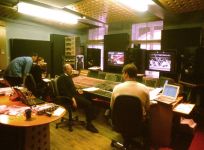 BS:
Do you think it's important to be able to read a music score in order
to make a better recording sessions?
DS: Reading music score is quite important, especially for recording
and mixing orchestral music. Unlike Pop music, Hip-Hop, etc., the
musical dynamics of orchestral music are created in the room. By reading
the scores, the mixer can participate in the dynamic adjustments necessary
to help create the appropriate balances the composer intended. For
orchestral recording capturing the room dynamics is essential, because
by doing so, you're actually mixing via the performance rather by
moving faders. It's much more effective sonically. BS: Let's talk
about recording sessions. How is the structure of them?
DS: The mixer is in charge of the recording session. It is my responsibility
to determine the placement each member of the orchestra in the room,
isolation booths, etc., which microphones to use, which preamplifiers,
effects, reverbs, limiters/compressors. Additionally, as most sessions
are now recorded to Protools, the format, track count, and layout
has to be specified. There is a huge amount of infrastructure to assemble
for these large sessions to take place. And the mixer is in charge
of this assembly. BS: Is there some criteria to place the performers?
DS: There is always a specific criterion for performer placement.
I have conversations with the composer to find out what he or she
has in mind for the score. I also try to see the movie prior to the
scoring sessions. Then I make my creative decisions as to performer
placement, orchestral layout, isolation, and mixing. BS: Does
a recording session begins and ends for you in the studio, or your
previous work at home is important?
DS: I generally do a substantial amount of homework prior to the
first recording session. In addition to the conversations with the
composer mentioned above, I'll speak to the orchestrator(s), synthesizer
technicians, Protools operator(s), scoring stage setup personnel,
scoring stage recordist, maintenance technician. Many times I will
speak to the orchestral contractor, who does the actual orchestra
hiring and payroll record keeping, to get the entire orchestra complement.
I'm quite often involved in budgeting, agents, studio negotiations,
and numerous other business aspects. So my job has greatly evolved
from music recording and mixing to multi-faceted businessman! BS:
Is it easier to mix an orchestral score or an electronic one? With
which ones you enjoy the most?
DS: Neither type of score is "easy" to mix. The challenge in orchestral
mixing is setting the proper dynamics in the recording process. An
electronic score, or an electronic/orchestral hybrid score, is more
demanding in the mixdown process. This is due to the fact that each
electronic sound coming out of whatever source device typically needs
processing. This is time consuming and creatively demanding. This
having been said, it also presents the greatest challenges to a mixer,
but also the greatest potential for creative achievements. It's quite
difficult to get synthesized sounds to mix together with orchestral
sounds in a pleasing, mutually enhancing way. If the synthesized sounds
are too loud, the orchestra will sound small, even though it may have
been physically quite large. If the synthesized sounds are too quiet,
they will loose impact and interest. So it becomes a delicate balance,
but the challenges of this score style are the most interesting to
me. 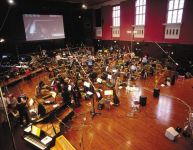 BS:
In which studios you work most often?
DS: I primarily record in one of 3 studios in Los Angeles: Sony
Pictures Studios, Fox Scoring Stage, and Todd-AO Scoring.
These are large studios capable of handling orchestras in excess of
100 players. I sometimes record in 2 other studios: Warner Bros.
Scoring and Paramount Scoring. These are smaller studios
capable of handling about 70+ musicians. I like mixing in either Warner
Bros Scoring or Signet Soundelux Studio B.
I have also recorded in Abbey Road Studios, Air Lyndhurst,
and CTS Watford Coliseum, in London. Abbey Road has,
what many feel, is the finest scoring stage in the world. BS:
Yearly you worked once on the recording of 11 soundtracks. Can this
work be tiring? or if you work with what you enjoy, you always want
more?
DS: Yes, this is extremely tiring. I work many long days, often in excess
of 14 hours/day. And numerous days in a row. I am always grateful for work,
and love what I do, but the film business is somewhat seasonal, with 2 major "seasons" (Summer
and Christmas), and is always quite busy around these times. Working in the
independent world with loyal clients, you have to remain available and accommodating.
This translates into difficult, tiring schedules. But it's the nature of my
business. BS: There are black legends floating around about recording sessions:
Directors or producers complaining, composers irritated with the bad orchestra
performance, orchestra directors that are changed... what is your experience
about this?
DS: The film business is a highly volatile, extremely risky venture. It
is not uncommon for an effects laden event film to cost in excess of $180 million.
With this kind of investment and risk level, it is quite understandable that
there will be nervous people responsible for the completion of this product.
As a result, nerves get frayed, and people under this kind of pressure sometimes
explode. It definitely happens, but it is surprisingly rare. I have been around
some very difficult moments, but the vast majority of my experiences have been
calm, reasonable, and professional. BS: I am sure that through all the
years you have worked, you have surely been involved in some funny situation.
In BSOSpirit we would love to hear some of them.
DS: One of the most amusing incidents occurred when I was just starting
out. As I mentioned earlier, I worked at MGM Recording Studios. I was
ALWAYS there. It seemed like I never went home. When there weren't sessions
going on, they'd let me take a tape into the studio and practice mixing. So
I became pretty familiar with the operation of the gear. One Friday evening,
there was just one session scheduled, so I was going to help out on the session,
then stay after to practice mixing. The mixer who was scheduled to do the session
showed up so drunk, he couldn't even stand up. The producer and I put him in
a cab to take him home. As it was Friday night, all the mixers had left for
the weekend and were unreachable (remember, as this was in the late 1960's,
it was way before cell phones, beepers, answering machines!). I was literally
the only person in the building who knew how to operate the equipment. So,
I did the session. It turned out to be the first solo album by the great jazz
guitarist Joe Pass, for Pablo Records and Norman Granz,
and was a big hit. Norman liked me, and I ended up doing quite a few
more projects for him including artists such as Ella Fitzgerald, Oscar
Peterson, Count Basie, Milt Jackson, Big Joe Turner, Sarah
Vaughn, and many others. Just being in the right place at the right time! 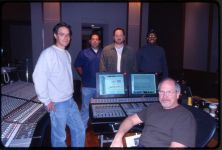 BS:
You have worked with a lot of great composers such as John Williams, Thomas
Newman, Randy Newman or Marc Shaiman, but without doubts,
you work more often in the works by Danny Elfman and Alan Silvestri.
Let's start talking about Elfman. How is to work with him?
DS: Danny is a great person to work with personally, and very challenging
and creative professionally. I truly enjoy his music and his projects, and
he has achieved the enviable ability to have developed his own voice and perspective
in film score. Danny allows me quite a bit of latitude and input to
the mixes. Additionally, he trusts my sensibilities, which adds to the collaborative
experience.
I have been quite fortunate to have worked with so many interesting and creative
people. And I say this referring to my entire career, especially in my television
experiences. I truly learned how to record and mix doing episodic television
work. As the music was typically recorded and mixed live, without any remix,
you had to be on your toes. It allowed me experimentation in a much less pressurized
environment, so I could discover what worked and what didn't. BS: Recently
you mixed the music for Spiderman 2. What could you tell us about this
work? which technical features has the music?
DS: This was actually one of the simpler scores, in terms of synthesized
elements, for Danny. That having been said, it was still about 95 minutes
of score recorded over 9 days and mixed in 15 days. So it still required a
huge amount of work.
We recorded to 2 Protools systems, one designed for recording the orchestra
at high sampling frequencies (96/192 KHz) which has 48 channels of very high
end outboard digital converters, and one system for the synthesized elements
which has high track count capabilities and numerous plugins. 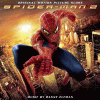
BS:
Did you think about your previous work in Spiderman in order to plan
the recording of the follow up?
DS: Typically not, as one movie (even a sequel) has little to do with another.
And our recording style and technology was different on this movie as opposed
to the last. The one strong consideration to the original Spider-Man movie
was relative to the "Main Title" music. They loved the original piece
so much, we basically re-recorded it. There is just one small added musical
theme relating to the new villain, Doc Ock. Otherwise, it's identical.
Though I prefer our new mix to the original! BS: It seems that composers
such as John Debney, Christopher Young or Joseph LoDuca wrote
additional music because it was impossible for Elfman to continue working
in the film. What is what actually happened? Did you participate in the recording
of the additional music?
DS: Danny had a prior commitment to move on to do some preliminary
work on 2 upcoming Tim Burton movies. Sam Raimi and Sony executives
wanted some additional music and changes, but Danny was unavailable
to address them. As a result, they brought in some other composers to execute
the changes. I was not involved in recording any of the additional music. BS:
With Alan Silvestri you started working in 1984 with Romancing the
Stone. 20 years later you two are still working together. What can you
tell us about your work with him?
DS: Actually, Alan and I started working together in 1978 on a television
show called "Chips" (mentioned above), so it's 26 years later and we're
still together! Romancing the Stone was the first feature we did, and
was a huge one for all involved. I've lost count, but I think we've now worked
on some 60+ features. Alan has given me wonderful opportunities and I owe him
a great deal. We have traveled to London, Paris, and Budapest to work. Some
of the projects for which I am most proud have been Alan's (Forrest
Gump, Predator, Back to the Future, Roger Rabbit). Alan has
displayed great trust in my abilities, and we have a very collaborative relationship. 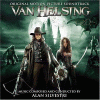
BS:
Recently you recorded his powerful score for Van Helsing. How was the
experience?
DS: This was an exceptional experience. The music was wonderful... big "muscle" music,
with lots of synth elements. It was a wonderful combination of old-time horror
music, with some rhythm elements. It was really fun to work on, but was a huge
amount of work. As I dubbed the movie as well as recorded and mixed the score,
I worked for some 5 weeks straight without a day off. It was grueling, but,
at the same time, very rewarding. Steve Sommers (director) and Bob
Ducsay (producer/film editor) are both great guys, extremely enthusiastic
and supportive. The perfect combination! BS: What is the last score you
have worked on and what are your plans for the future?
DS: The last score I worked on was for a French movie called "A Very
Long Engagement" with a composer named Angelo Badalamenti. As for
the future, I have the new Bob Zemeckis movie coming up next month called "Polar
Express" with Alan Silvestri. I hope to stay reasonably busy doing
film score recording and mixing. It's what I love to do. BS: In case is
not a so difficult question, what is the recording session you are most satisfied
with?
DS: This is a VERY difficult question, as I've been so fortunate to record
so much spectacular music. How could I pick between Ella, Count Basie, Alan
Silvestri, Danny Elfman, ...??? But I don't think I've ever been
truly satisfied with any session, as I typically feel I could have done better,
or maybe would have done something a bit different. But I feel that being my
harshest critic keeps me on my toes and pushes me to continue to try to improve
my work. I also stay very involved in the newest technologies, though this
subject could be a conversation unto itself!
BS: And the best
soundtrack you have recorded?
DS: This is probably a question for someone other than
me, but I would probably pick the following:
- Planet
of the Apes - Danny did a spectacular job on this;
huge music, massive amount of tracks to mix (200+); I was
very proud of the final mixes. Forrest Gump - Great
score and movie; got my first Academy Award nomination.
- American
Beauty - Highly stylized, unique score; I was very involved
in the production of the score.
BS: We'd like
to thank you again for your kindness and willingness to answer these
questions.
DS: You're very welcome. Thank you for your interest in what I do.
Interview for BSOSpirit by Rubén
Sánchez and Pablo
Nieto
|





